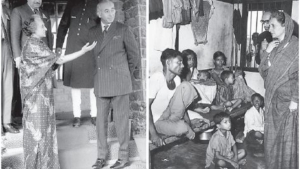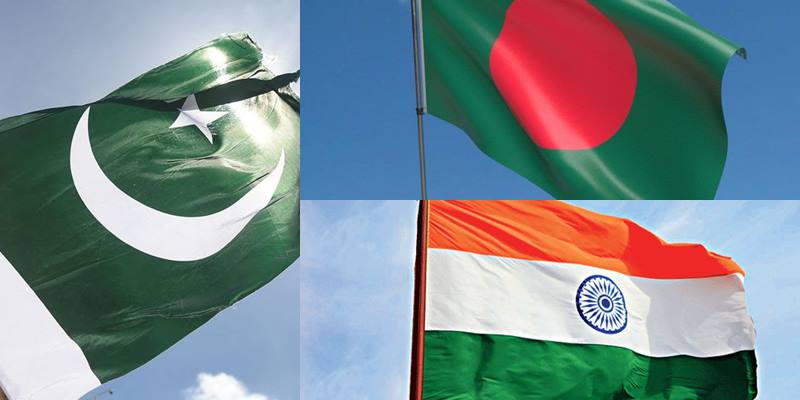This following article was first published in The Hindu on December 16, 2011.
Forty years ago, South Asia underwent another traumatic experience with the Bengali separatist movement in East Pakistan, the India-Pakistan war and the eventual creation of Bangladesh. South Asians are a strange lot. In 1947, the political elites refused to accommodate each other and a hurried, bloody Partition was imposed on millions. Instead of working to undo the harmful effects of 1947, India and Pakistan found themselves entangled in yet another battle. Again this time it was the intransigence of West Pakistani elites to accede to the Bengali demand for autonomy, and India’s short-sighted decision to momentarily ‘benefit’ from its neighbour-enemy’s woes. The jury is still out on whether 1947 and 1971 were avoidable or at least could have been handled in a manner that involved less suffering, and bloodshed.

Tailor-made histories
What has however happened is that three nation-states (some say state-nations) now exist with three standing armies, nationalist discourses, honour and of course tailor-made histories.
In Pakistan, a child grows up learning that it was an Indian conspiracy, woven through the Hindu teachers of “East Pakistan” that led to the separatism of the Bangladeshis. For instance, here is a passage from a secondary school textbook: “There were a large number of Hindus in East Pakistan. They had never really accepted Pakistan. A large number of them were teachers in schools and colleges. They continued creating a negative impression among the students. No importance was attached to explaining the ideology of Pakistan to the younger generation. The Hindus sent a substantial part of their earnings to Bharat, thus adversely affecting the economy of the province.”
On the other hand, some textbooks in Bangladesh that I have seen paint Pakistanis as rather unsavoury characters, if not complete villains and butchers. They cannot be blamed for this resentment – what a united Pakistan and its civil-military bureaucracy did in East Pakistan was quite unforgivable. I hold the view that India also nurtured the paranoia for generations to come through the Schadenfreude it articulated in 1971; and, talk to any Pakistani and he or she would give you 1971 as the example of utter treachery of the Indian side. This mess makes the task of us peace activists rather insurmountable.
The 1971 human tragedy and subsequent triumph of Bengali nationalism have lessons for all three countries. Most notably for Pakistan, that its remote, centralised governance and negation of ‘local’, multiple identities was not working. However, rather than imbibe the lesson, the Pakistani state and a vast majority of its people have simply ‘erased’ the bitter memory and focused on India as the real problem.
The Indian role may partly be true but to focus on it is to create a lop-sided, warped history of the kind provided in that secondary school textbook. Not surprisingly, a large number of young Pakistanis – the dominant demographic group – are unaware of what really happened in 1971. Perhaps this is how people in Pakistan learnt to deal with the loss and the trauma: by pretending to forget it.
Growing up in post-1971 Pakistan, I too was blissfully unaware until my senior classes. But I was on the privileged side of the country’s education apartheid, so I had the opportunity of reading some alternative texts and finding teachers who were not made from the ultranationalist “ideological” mould. However, I could not help notice when I entered Lahore’s Government College how indoctrinated my peers were in the dominant narrative.
For them – as a grade 5 book sets it out – the plot was simple: “After the 1965 war, India, with the help of the Hindus living in East Pakistan, instigated the people living there against the people of West Pakistan, and at last in December 1971 herself invaded East Pakistan.” In a classroom, I invited the ire of my teacher by mentioning the excesses made by Pakistani state in East Pakistan.
In Pakistan
The worst fallout of the 1971 debacle was the excessive militarism that emanated from the resultant deep insecurity of the Pakistani state. Zulfikar Ali Bhutto’s nationalist rhetoric remained anti-Indian, focused on the neighbour’s conspiracy to separate East Pakistan from us. By Zia-ul-Haq’s time, this rhetoric acquired a deeper dimension. One social studies textbook line summed it all up thus: “All of us should receive military training and be prepared to fight the enemy.” The enemy was India.
As if the separation of East Pakistan was not sufficient, the U.S. and Saudi-funded ‘jihad’ in Afghanistan changed the complexion of Pakistan permanently. It resulted in the complete breakaway from the plural ‘Muslim’ country that was Jinnah’s vision of Pakistan, a vision for which Bengalis too had struggled. Ironies have multiplied over the decades; the Pakistan project without the Bengalis is almost a new country.
Several of us in Pakistan have been advocating curricula reform. Certainly, reformed textbooks have also appeared, but these books are restricted to English medium schools. For the rest, the distortions of Bhutto and Zia continue, attempting to recover from the 1971 shock.
Forty years later, it is time for Pakistan to admit that it wronged Bangladeshis. Certain wounds are difficult to heal but an effort can be made. Not just by Pakistan apologising to Bangladesh but also recognising that it must respond to the ongoing struggles in the country’s northwest and South; and that increased autonomy strengthens polities.
The 18th Amendment to the Constitution, which the National Assembly adopted in 2010, is a major step in this direction. In a similar vein, India might also introspect a little. As a nation, it also faces several ‘local’ upheavals; the use of force in the northeast or in Kashmir may not be the answer.
Dealing with history squarely and honestly will help put the past behind for all three of us in South Asia. Indira Gandhi’s notorious remark on the death of two-nation theory in 1971 was more rhetoric than reality. After all, Pakistan survives and Bangladesh exists on the other side. My various trips to Bangladesh have given me the impression that the younger generations have moved on. Yes, they read the 1971 horror tales and their separateness and nationalism vis-à-vis Pakistan (as well as India) is undeniable. Yet, they are far from the event. After two partitions and several wars, perhaps the time has come to move on. In Pakistan for sure, but across South Asia as well.



